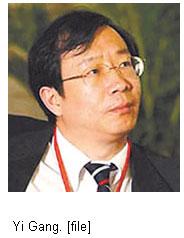
The primary risk to China's economy is inflation and the government will stick to the tight monetary policy, said central bank vice governor Yi Gang in Beijing on Sunday.
However, the tightening measures would be "proper" and "moderate" to avoid recession, Yi said at a seminar on Chinese economy held in the Peking University.
Last December, China decided to shift its monetary policy "from prudent to tight" in 2008 to prevent overheating and a surge in inflation.
Although the impact of the US sub-prime crisis was spilling over and China was suffering from the worst snow havoc in 50 years, the government would not change its tight monetary policy, Yi said at a seminar.
The People's Bank of China had evaluated the influences of the two factors on investment, consumption and trade and would keep the policy unchanged, he added.
The tight monetary policy meant that the annual increment of China's M2 money supply, covering cash in circulation plus all deposits, would decline to 16 percent in 2008 while the increment of bank loans would stand less than 16.1 percent as in 2007, Yi explained.
In January, China's M2 rose 18.94 percent from a year earlier while 2.2 percentage points higher than the number at the end of 2007.
China's GDP growth rate would reach about 10 percent this year, less than the 11.4 percent in 2007, but still strong, he predicted.
(Xinhua News Agency February 25, 2008)